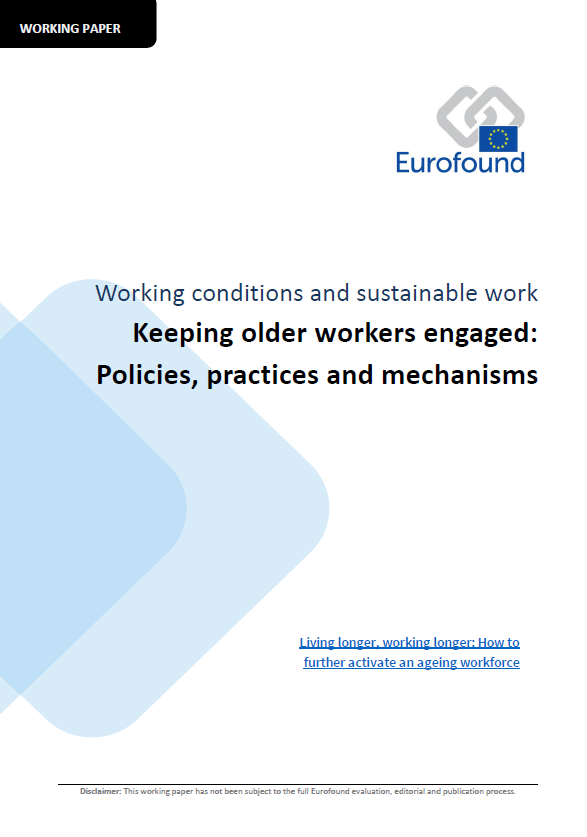EU context
Trots betydande tillväxt i fråga om andelen äldre arbetstagare med sysselsättning under det senaste årtiondet i många EU-länder påpekas det i kommissionen gemensamma sysselsättningsrapport från 2017 att det finns potential att öka dessa andelar ytterligare. Under 2016 var sysselsättningsgraden hos äldre arbetstagare i åldern 55–64 i EU 55,3 procent jämfört med 66,6 procent för dem i åldern 15–64 som en helhet. Denna ökning har varit störst bland äldre kvinnor.
Den europeiska pelaren för sociala rättigheter erbjuder en ram för att hjälpa arbetsmarknaderna att anpassa sig efter nya utmaningar samtidigt som man främjar rättvisa och solidaritet mellan generationerna. I pelaren framhålls rätten till en arbetsmiljö som är anpassad efter arbetstagarens yrkesmässiga behov för att göra det möjligt för honom eller henne att förlänga sitt deltagande på arbetsmarknaden. I det nyligen överenskomna fristående avtalet mellan Europas arbetsmarknadsparter om aktivt åldrande och en generationsöverskridande strategi åtar sig parterna att göra det lättare för äldre arbetstagare att delta aktivt och stanna kvar längre på arbetsmarknaden.
Eurofounds arbete
Eurofound har sedan länge expertis i frågor som rör den åldrande arbetskraften. Sedan 1990 har forskningen varit inriktad på arbetsmarknadsdeltagande, arbetsförmåga, arbetsvillkor och arbetspreferenser bland äldre arbetstagare mot den politiska bakgrund som utgörs av Europas skiftande demografiska profil. Arbetet har också fokuserat på statligt stöd och initiativ på företagsnivå som främjar sysselsättningen bland äldre arbetstagare. Man har tittat på äldre kvinnliga arbetstagare och belyst de ökande sysselsättningstalen för denna grupp och deras ökande andel av arbetskraften, särskilt i åldersgruppen 55–64.
Data från undersökningar
Eurofounds större undersökningar tillhandahåller en mängd data om situationen bland äldre arbetstagare. I den sjätte europeiska undersökningen om arbetsvillkor (EWCS) tittar man på hur äldre arbetstagare skattar olika aspekter av kvalitet i arbetet. Trots att det är mindre sannolikt att äldre arbetstagare blir arbetslösa än yngre visar uppgifterna att äldre arbetstagare känner att om de blir av med sitt arbete så skulle de inte hitta ett nytt arbete med samma lön, och skulle till och med ha svårt att ta sig in på arbetsmarknaden igen.
En studie som baseras på Eurofounds femte europeiska undersökning om arbetsvillkor (EWCS) tittar på kännetecknen för den äldre arbetskraften och för arbete i olika åldrar, liksom på faktorer som gör arbetet hållbart för en åldrande arbetskraft: bra arbetsvillkor, fysiskt och psykiskt välmående samt balans mellan arbetslivet och privatlivet.
Eurofounds undersökning om livskvaliteten i Europa (EQLS) erbjuder åldersrelaterade uppgifter med avseende på olika aspekter av livskvalitet i Europa. En analys av arbetspreferenserna efter det att arbetstagarna fyllt 50 år utgår från uppgifter i den tredje EQLS och visar att många äldre arbetstagare föredrar att arbeta färre timmar, även med tanke på deras ekonomiska behov. Genom att underlätta denna anpassning av arbetstimmar efter preferenser kan man göra det möjligt för och motivera människor att arbeta längre.
Längre arbetsliv
Nyligen anslöt sig Eurofound till tre andra EU-byråer för att titta på åldersvänligt arbete i Europa, de politiska utmaningar som hör ihop med den åldrande arbetskraften och innovativa lösningar.
Många arbetstagare kan eller vill inte arbeta fram till den lagstadgade pensionsåldern. Det finns dock också en grupp som kan och är villig att arbeta längre än den. Eurofound har undersökt detta växande fenomen med människor som väljer att fortsätta jobba efter pensionen.
Aktuell forskning har inriktats på hur man kan förlänga arbetslivet genom flexibla pensionssystem, där man särskilt tittat på system med delpension som kan underlätta detta. Översyner mitt i karriären kan också bidra till längre arbetsliv. Forskarna har tittat på hur de kan hjälpa till att klargöra arbetstagarnas alternativ för att fortsätta arbeta till en senare pensionsålder. Forskningen belyser olika instrument som tagits fram av företag för att behålla åldrande arbetstagare.
I annan forskning dokumenterar man nationella och branschspecifika initiativ på statlig nivå och bland arbetsmarknadsparter för att behålla äldre arbetstagare på arbetsmarknaden, inklusive finansiella incitament och förbättrade villkor. Under ett tidigare projekt analyserades initiativ för hantering av åldersfrågor som introducerats före och efter lågkonjunkturen för att framhålla god praxis vid europeiska företag.
Resurser
















